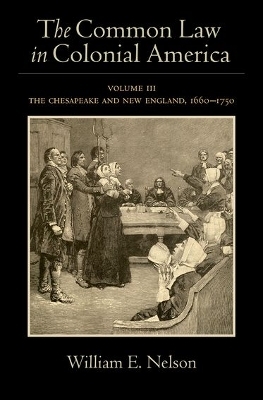
The Common Law in Colonial America
Oxford University Press Inc (Verlag)
978-0-19-046505-6 (ISBN)
In a projected four-volume series, The Common Law in Colonial America, William E. Nelson will show how the legal systems of Britain's thirteen North American colonies, which were initially established in response to divergent political, economic, and religious initiatives, slowly converged until it became possible by the 1770s to imagine that all thirteen participated in a common American legal order, which diverged in its details but differed far more substantially from English common law. Volume three, The Chesapeake and New England, 1660-1750, reveals how Virginia, which was founded to earn profit, and Massachusetts, which was founded for Puritan religious ends, had both adopted the common law by the mid-eighteenth century and begun to converge toward a common American legal model. The law in the other New England colonies, Nelson argues, although it was distinctive in some respects, gravitated toward the Massachusetts model, while Maryland's law gravitated toward that of Virginia.
William E. Nelson, is the Edward Weinfeld Professor of Law and Professor of History, at New York University.
Introduction
I. Maryland and the Shift to Protestantism
A. Maryland's Unique Judicial System
1. The Neutrality of Judges
2. The Law-Finding Power of Juries
B. The Substance of Maryland's Law
1. Commercial Litigation
2. Debt Collection
3. Land Law
4. The Law of Slavery and Servitude
5. Administrative Law
6. Criminal Law
C. Summary
II. The Weakness of the Law in Post-Restoration Virginia
III. Strengthening Virginia's Legal Order
A. The Switch from White to Black Labor
B. Patronage and Noblesse Oblige
C. Law and Religion
D. Reception of the Common Law
E. Judge and Jury
IV. Center and Periphery: The Localization of Power in Colonial Virginia
A. The Jurisdiction of Country Courts
B. The Structure of Political Power
C. The Structure of Legal Knowledge
D. The Independence of County Courts
V. The Substance of Virginia Law
A. Capital and Debt
B. Land Law
C. The Law of Slavery
VI. The Persistence of Puritan Law in Massachusetts, 1660-1685
A. Reception of the Common Law
B. Law and Religion
C. Law and Morality
D. Morality and the Regulation of the Economy
E. Morality as a Restraint on Power
1. Servants and Laborers
2. Strangers
3. Married Women
F. Summary
VII. The Establishment of Royal Government and Continued Reception of the Common Law
A. Preserving the Puritan Structure of Institutions
B. Continued Reception of the Common Law
C. The Emergence of Substantive Law
VIII. The Continued Preservation of Puritan Law
A. Puritan Inheritance Law
B. Law and Religion
C. Law and Morality
D. Morality and Regulation of the Economy
E. Morality as a Restraint on Power
1. Servants and Laborers
2. Strangers and the Poor
3. Married Women
F. Summary
IX. The New England Satellites: Connecticut, New Hampshire, and Rhode Island, 1660-1750
A. The Early Replication of Puritan Legality
1. Criminal Law
2. Administrative Jurisdiction
3. Civil Procedure
4. Substantive Law
B. The Professionalization and Formalization of the Law
1. Juries as Lawfinders
2. Pleading and Procedure
3. Substantive Law
C. Summary
X. Conclusion: The Success of British Imperial Policy
| Erscheinungsdatum | 24.05.2016 |
|---|---|
| Verlagsort | New York |
| Sprache | englisch |
| Maße | 155 x 236 mm |
| Gewicht | 635 g |
| Themenwelt | Geisteswissenschaften ► Geschichte ► Regional- / Ländergeschichte |
| Geschichte ► Teilgebiete der Geschichte ► Militärgeschichte | |
| Recht / Steuern ► Allgemeines / Lexika | |
| Recht / Steuern ► EU / Internationales Recht | |
| Recht / Steuern ► Rechtsgeschichte | |
| ISBN-10 | 0-19-046505-0 / 0190465050 |
| ISBN-13 | 978-0-19-046505-6 / 9780190465056 |
| Zustand | Neuware |
| Haben Sie eine Frage zum Produkt? |
aus dem Bereich


